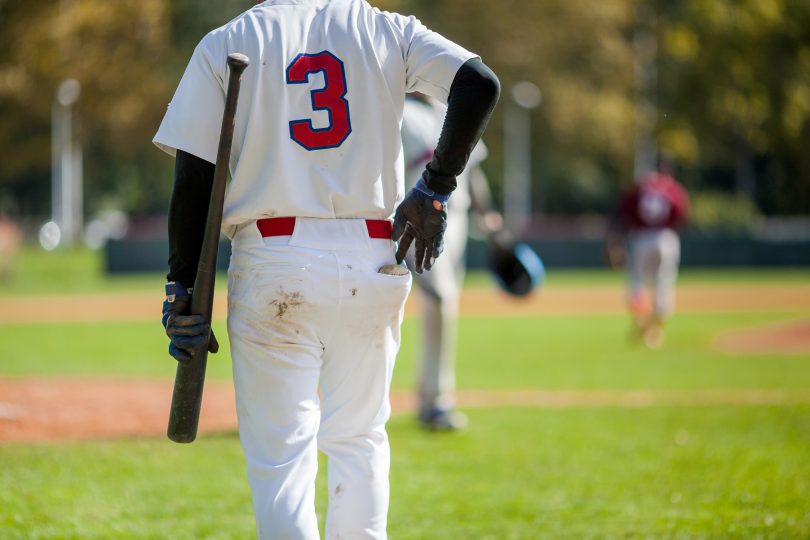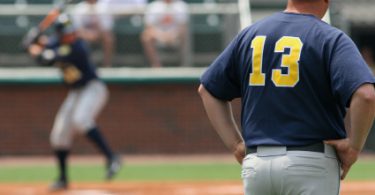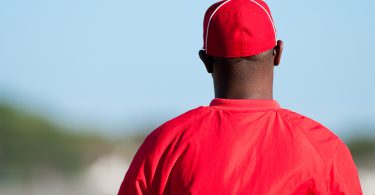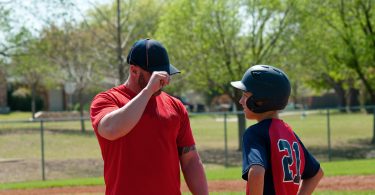Inside the Recruitment takes an in-depth look at the recruiting process as described by players who have been through it before. Each article features a new player, whose varied experiences offer you an inside look at the college baseball recruiting process. We hope their stories will show you that there are many routes to college baseball and each recruit’s experience is unique. Most of all, we hope you can learn from their stories and use their advice to help you find your college baseball fit!
Player Profile
Name: Jeff Dsida
Position: Catcher
High School: New Trier High School (Winnetka, IL)
College: Carleton College
Jeff Dsida knew he wanted to play college baseball early in his high school career at New Trier High School, a perennial powerhouse outside of Chicago. He also knew he wanted to attend a strong academic school and study abroad in Spain. After targeting a mix of academic D1 and D3 programs and making visits to his top choices, Dsida applied during the binding Early Decision II period to Carleton College. As a Catcher for Carleton, Dsida stacked up many accolades, including All-Conference, All-Region, and the school’s all-time triples record. KPB sat down with Dsida to talk about contacting schools, recruiting differences for academic schools, not being afraid of rejection, and more. Recruiting lessons and great advice abound!
You mentioned you got some help from a coach who was familiar with the recruiting process. What was some of the best advice you received?
When you are at the start [of the recruiting process], you really have to be an advocate for yourself. You’ve got to be reaching out to coaches often and really don’t be afraid to get rejected by a coach. They get a lot of [recruiting] emails and sometimes they don’t have time and sometimes you’re just not what they are looking for. So I think that is one [piece of advice] that was good for me because I was a little bit on the shy side in high school and I was a little bit intimidated by the fact that I was the one reaching out to these college coaches who seem to have so much power at the time over my future.
What did you do to work through that initial intimidation?
Getting brushed aside was a little bit difficult at first, because I wasn’t really sure how to get these guys interested in me. Once I got “rejected” by a couple of these coaches, I realized worst-case scenario is I get blown off or I get a bad email. If they are not interested, I can move on to the next one and I can put that behind me, and it’s water under the bridge. Really, it’s only in your interest to try to cast a wide net. It’s great when a coach says, “we’d love to learn more about you.” But if not, you kind of have closure and say, “well they didn’t want me for X, Y, Z, I’m gonna prove them wrong when I go play at this place.”
How did you determine which coaches to reach out to?
I wasn’t playing as a junior, so I realized I probably wasn’t destined to be recruited really hard by any of the really elite programs. My parents always would say to make sure you are thinking about the school as well as the baseball. Because with sports in general, one pitch or one play could be your last, so you’ve gotta make sure you like the school portion of it as well. Otherwise, if you hurt your elbow or get a concussion and aren’t able to play anymore, you’re stuck at that school that you don’t want to be at and the one thing that you had going for you at the school is now gone. So I really looked at the academics a lot and I reached out to some D1 schools and some D3 schools, and just tried to find a good academic fit that also happened to be a good baseball fit.
What was your strategy emailing coaches?
I didn’t just spam coaches left and right where I would say alright I’ve got 50 email address of 50 coaches around the country, I’m just going to send them all the same email. I usually tried to make it so that there was some form of personalization so that they knew I wasn’t just spamming them. I would look into the school and kind of say some things about what I was interested in and that I was interested in learning more about the program or the school from them. And I think that is helpful. It’s the same thing as a player, if you get a form letter from a school that’s not as meaningful as some coach writing a letter saying “oh I saw you at such and such showcase, I like what you did and I’d like to learn more about you”. That’s a lot more meaningful, so if you include some details about why you are interested, it makes it a better situation for both sides.
D3 and especially high academic schools have a little different timeline. How did this play out for you?
The process is different because it’s not like you are going to be getting a scholarship or signing a letter of intent to go to this school. The timeline is definitely different because there is a little bit less clarity. Normally what would happen is I would get in contact with the coaches and if they expressed some mutual interest, I would kind of pick their brains and see what they thought of my grades and my talent compared to other guys that they’d recruited. I wanted to know, realistically, whether my grades would be good enough to get me in on my own or whether baseball would be able to help me. Normally what they would say is, “I can’t make any promises, but in the past, situations X, Y and Z have happened.” So there was definitely uncertainty and even if a coach was really interested, because of the academic portion, they couldn’t make any promises.
You ended up taking a mix of overnight and regular daytime campus visits. How was that helpful in making your decision?
I was really able to get a clearer picture of what the campus is like and what the people are like. Face-to-face interactions are a little bit more meaningful when you are dealing with somebody that is going to be a big part of your future. Your baseball coach and your potential teammates there are big parts of the college process and how everything goes, so to be able to meet them in person and shake their hand and talk with them, it really helps you understand who that person is.
Any advice for guys when they are visiting campus?
As cheesy as it sounds, just be yourself. I hosted a number of perspective students [on their overnight visits]. You just want to get to know the person. And so I think it’s in your best interest as a recruit and the programs best interest for them really to get to know who you are. So if you’re kind of an outgoing guy who like to brag a bit, then be that person. But if you’re someone who’s normally a little bit quieter and more reserved, be that person. Obviously, try to get what information you want out of guys in the program because they were in your shoes just a couple of year ago, but you don’t want to be fake on the visits.
Excellent advice. We have just one last question for you. What’s your best advice for a high school player looking to play in college?
Don’t be afraid to put yourself out there. Everyone is going to get some form of rejection, unless you are just the best player there is. So whether they have five players at your position already, or you’re not big enough, not good enough, not smart enough, you’re going to have to deal with some sort of rejection. It’s really easy to just kind of shy away from any rejection and not really try to reach for any schools. You want to really put yourself out there, make a statement and get yourself in the best program for you. So, I think that all comes from not being afraid to fail when it comes to reaching out to schools.







